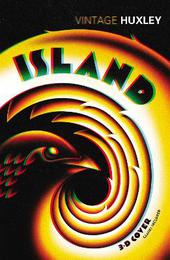
|
Island
Paperback / softback
Main Details
| Title |
Island
|
| Authors and Contributors |
By (author) Aldous Huxley
|
|
Introduction by David Bradshaw
|
| Physical Properties |
| Format:Paperback / softback | | Pages:304 | | Dimensions(mm): Height 198,Width 129 |
|
| Category/Genre | Classic fiction (pre c 1945) |
|---|
| ISBN/Barcode |
9780099477778
|
| Classifications | Dewey:823.912 823.912 |
|---|
| Audience | |
|---|
|
Publishing Details |
| Publisher |
Vintage Publishing
|
| Imprint |
Vintage Classics
|
| Publication Date |
7 April 2005 |
| Publication Country |
United Kingdom
|
Description
For over a hundred years the Pacific island of Pala has been the scene of a unique experiment in civilisation. Its inhabitants live in a society where western science has been brought together with eastern philosophy and humanism to create a paradise on earth. When cynical journalist, Will Farnaby, arrives to search for information about potential oil reserves on Pala, he quickly falls in love with the way of life on the island. Soon the need to complete his mission becomes an intolerable burden...In counterpoint to Brave New World and Ape and Essence, in Island Huxley gives us his vision of utopia.
Author Biography
Aldous Huxley was born on 26th July 1894 near Godalming, Surrey. He began writing poetry and short stories in his early twenties, but it was his first novel, 'Crome Yellow' (1921), which established his literary reputation. This was swiftly followed by 'Antic Hay' (1923), 'Those Barren Leaves' (1925) and 'Point Counter Point' (1928) - bright, brilliant satires in which Huxley wittily but ruthlessly passed judgement on the shortcomings of contemporary society. For most of the 1920s Huxley lived in Italy and an account of his experiences there can be found in 'Along The Road' (1925). The great novels of ideas, including his most famous work 'Brave New World' (published in 1932, this novel warned against the dehumanising aspects of scientific and material 'progress') and the pacifist novel 'Eyeless in Gaza' (1936) were accompanied by a series of wise and brilliant essays, collected in volume form under titles such as 'Music at Night' (1931) and 'Ends and Means' (1937). In 1937, at the height of his fame, Huxley left Europe to live in California, working for a time as a screenwriter in Hollywood. As the West braced itself for war, Huxley came increasingly to believe that the key to solving the world's problems lay in changing the individual through mystical enlightenment. The exploration of the inner life through mysticism and hallucinogenic drugs was to dominate his work for the rest of his life. His beliefs found expression in both fiction ('Time Must Have a Stop', 1944 and 'Island', 1962) and non-fiction ('The Perennial Philosophy', 1945, 'Grey Eminence', 1941 and the famous account of his first mescalin experience, 'The Doors of Perception', 1954. Huxley died in California on 22nd November 1963.
ReviewsIn the whole history of world literature, no writer has been better equipped to create images of false and true utopias than Aldous Huxley. Even when he has been satirising the false, the true has always been implicit in his work. We cannot deny Island's brilliance, its learning and its honest attempt to answer the big human questions -- Anthony Burgess In the current climate, the novel's warnings about religious fanaticism, the exercise of massive military power, the geopolitical importance of oil and the development of artificial insemination seem extraordinarily prophetic * Guardian * One of the truly great philosophical novels * The Times *
|